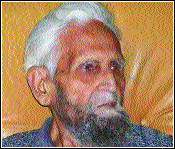








|
|

|
|

February 27, 2005
ARTICLE: For old time’s sake
 Brig Suleman, 80, a retired army officer, has a heart and mind that are still audacious enough to think up many a challenging scheme to right the wrongs in the world around him. He is a person who truly believes that it is never too late to experiment with life
Brig Suleman, 80, a retired army officer, has a heart and mind that are still audacious enough to think up many a challenging scheme to right the wrongs in the world around him. He is a person who truly believes that it is never too late to experiment with life
“I had served with Maj-General Sher Ali Pataudi as a junior officer when his regiment was posted in the same brigade as mine.” This is what Brig Suleman remembers of the author of The Story of Soldiering and Politics in India and Pakistan, the book he has immersed himself in these days. Old links with a man he once admired and befriended, inspired him to dig this book out which was every bit worth the effort.
Sher Ali Pataudi was a scion of the princely Pataudi family of India. At the time of partition he opted for this part of the subcontinent — as a member of the Indian armed forces. This book is all about his life, his career and the choices he made along the way, but all this is in keeping with the main theme of his book — soldiering and politics.
For Brig Suleman this book holds a special meaning because he can amply relate to the times that Sher Ali talks about, and thus he remarks that “constitutionally we all belonged to the Indian army, only those who volunteered, came to Pakistan, and he was one of them I was also one of them. He was ideologically so motivated that he had to come to Pakistan”.
The book starts from the day when Sher Ali was commissioned; that was in 1933. He states his motivation for coming to Pakistan but without saying so in too many words, he hints that India was the home he left behind.
The book is a gripping account of how Sher Ali joined the army, why he volunteered to come to Pakistan, his days in the Pakistan army and then as a diplomat and as a member of the cabinet. He analyzes the tragedies that have befallen us after independence and the pervasive role of the military in the politics of this country. Serving at close quarters with Ayub Khan and then with Yahya, as a member of his cabinet, he gives a first hand account of the people who shaped the eventful history of this country. But in the end the author emerges as a true devotee of the Pakistani cause. As Brig Suleman puts it, “He was a devoted man and not once in the book does he regret his decision to come to Pakistan.”
Shahab Nama is another book on a similar theme, but this time in Urdu and written by Qudratullah Shahab, that Brig Suleman feels very passionately about. He adds, “I have read this book many times over but it still never ceases to capture my interest.” It is an autobiographical work of Qudratullah Shahab who was in the Indian civil service but came to Pakistan after partition. The events he mentions in this book date back to 1938 when he first started maintaining a diary, penning down incidents of interest. The diary eventually gave rise to this voluminous book which encapsulates in it an era starting from his days of youth to all the events that shaped his life thereafter. His extraordinary style of writing breathes a new life into the mundane but sometimes not so mundane incidents that he narrates and every time the reader is left with even more praise for the author for his impeccable faith and strength of character.”
For Brig Suleman this is a book that has to be read and reread to do true justice to the author and to pick up many a useful tips on how to live life.
|
|
|